Week 10: Credibility/Authority (*=Key reading)
> Search and the Information Landscape (530)
* SHEG: How to Find Better Information Online: Click Restraint. Curriculum Index. SHEG: Lateral Reading. SHEG: Civic Online Reasoning in Action. *Introduction to Crash Course Navigating Digital Information #1. *The Facts about Fact Checking: Crash Course Navigating Digital Information #2.
The ‘infodemic’ of COVID-19 misinformation, explained. *Enough with the CRAAP: We're just not doing it right - NeverEndingSearch. It’s not the web it used to be and our traditional approaches to teaching about it no longer make sense.
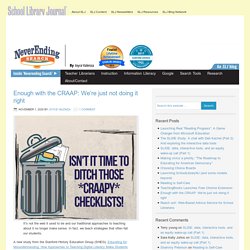
In fact, we teach strategies that often fail our students. A new study from the Stanford History Education Group (SHEG): Educating for Misunderstanding: How Approaches to Teaching Digital Literacy Make Students Susceptible to Scammers, Rogues, Bad Actors, and Hate Mongers, reveals some of the issues. Researchers studied 263 college students at a large East Coast state university and presented them with two tasks.
*Truth, truthiness, triangulation: A news literacy toolkit for a “post-truth” world. We were guaranteed a free press, We were not guaranteed a neutral or a true press.
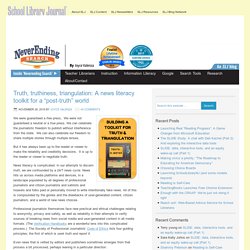
We can celebrate the journalistic freedom to publish without interference from the state. We can also celebrate our freedom to share multiple stories through multiple lenses.
How Librarians Can Fight QAnon. It’s time for a thorough revamping of the purpose of inviting students to engage in inquiry as a civic practice.
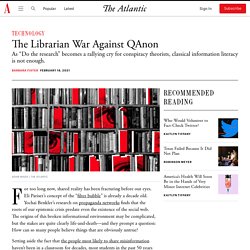
Educators, including librarians who teach, will need to confront and clarify their own beliefs and assumptions about how they know what is real and what isn’t. It will take work. But there are some promising places to start. First, taking a leaf from an organization formed to advise journalists on how to cover a divisive election, educators should consider ways to frame discussions of knowledge through the lens of democracy rather than through partisan political positions. This means being willing to take a strong stand on behalf of ethical research practices, the voices of qualified experts, and the value of information systems that judiciously vet and validate information, along with a willingness to clearly reject the notion that truth is simply a matter of political allegiance or personal choice.
Mike Caulfield on SIFTing through Trends in Electoral Misinformation (NWP) from 7:24 through 17:20. DigiPo4 MovesInfographic. SIFT (The Four Moves)
WHO: How to protect yourself in this infodemic. WHO: Managing the COVID-19 infodemic: Promoting healthy behaviours and mitigating the harm from misinformation and disinformation. The Coronavirus disease (COVID-19) is the first pandemic in history in which technology and social media are being used on a massive scale to keep people safe, informed, productive and connected.
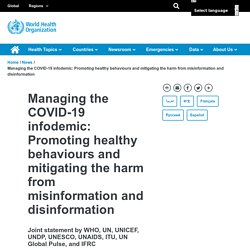
At the same time, the technology we rely on to keep connected and informed is enabling and amplifying an infodemic that continues to undermine the global response and jeopardizes measures to control the pandemic.
WHO: Let’s flatten the infodemic curve. We are all being exposed to a huge amount of COVID-19 information on a daily basis, and not all of it is reliable.
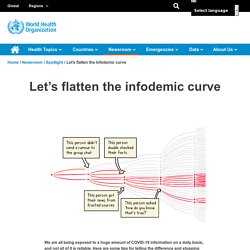
Here are some tips for telling the difference and stopping the spread of misinformation. Due to COVID-19, most of us have a new word in our vocabulary: epidemiology. It is the branch of medical science that deals with the ways diseases are transmitted and can be controlled in a population. Now it is time to learn another new word: infodemiology. As humans, we are a curious and innovative species. But it is not only scientific studies.
*Web Literacy for Student Fact-Checkers – Simple Book Production.
Isn't it time to stop Wikipedia shaming? - NeverEndingSearch. I am currently working on a research project with partners from the University of Florida and OCLC.
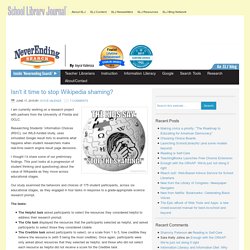
Researching Students’ Information Choices (RSIC), our IMLS-funded study, uses simulated Google result lists to examine what happens when student researchers make real-time search engine result page decisions. I thought I’d share some of our preliminary findings. This post looks at a progression of student thinking (and questioning) about the value of Wikipedia as they move across educational stages. Our study examined the behaviors and choices of 175 student participants, across six educational stages, as they engaged in four tasks in response to a grade-appropriate science research prompt.
The tasks: Among the results common to the choices presented to all students in the study was a Wikipedia article on the subject of the simulation, the impact of the Burmese Python on the habitat of the Everglades. Wikipedia: Helpfulness vs. citability across the grade-level cohorts (RSIC Study) Okay. Okay.
How to Use Wikipedia Wisely. NAMLE: Coronavirus Resources. We’ve curated a collection of resources exclusively from our Organizational Partners designed to support educators, parents, and students during the pandemic lockdown.
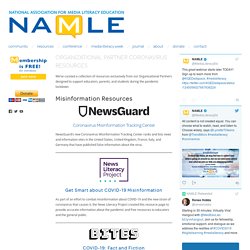
Misinformation Resources Coronavirus Misinformation Tracking Center NewsGuard’s new Coronavirus Misinformation Tracking Center ranks and lists news and information sites in the United States, United Kingdom, France, Italy, and Germany that have published false information about the virus.
Online Civic Reasoning (edWeb webinar)
Presented by Michelle Luhtala, Library Department Chair, New Canaan High School, CT; Jennifer LaGarde, Author and Consultant; and Kristine Goldhawk, Social Studies Teacher, New Canaan High School, CT Sponsored by Mackin Educational Resources Get a CE Certificate for this edWebinar Learn more “Nothing you can say will convince me otherwise.”
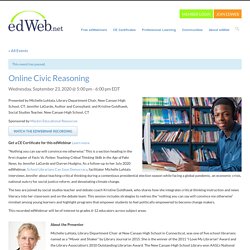
This is a section heading in the first chapter of Facts Vs. Fiction: Teaching Critical Thinking Skills in the Age of Fake News, by Jennifer LaGarde and Darren Hudgins. The two are joined by social studies teacher and debate coach Kristine Goldhawk, who shares how she integrates critical thinking instruction and news literacy into her classroom and on the debate team. This recorded edWebinar will be of interest to grades 6-12 educators across subject areas.
Critical Media Project. Students' Civic Online Reasoning. Executive Summary The next presidential election is in our sights.
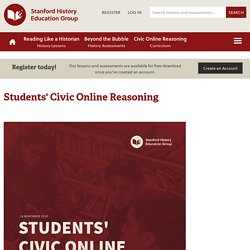
Many high school students will be eligible to vote in 2020. Are these first-time voters better prepared to go online and discern fact from fiction? Overview In November 2016, the Stanford History Education Group released a study showing that young people lacked basic skills of digital evaluation.
Your kids are probably confused about the news. Help them figure out the truth.
*Lateral Reading and the Nature of Expertise: Reading Less and Learning More When Evaluating Digital Information.
MediaWise: How to sort fact from ficton online - Poynter. Misinfo Monday: Are Algorithms Feeding You Crap? (Look for others in this weekly Mozilla blog)
Have you ever had a discussion with a family member or an old friend, and felt like they were living on a completely different planet?
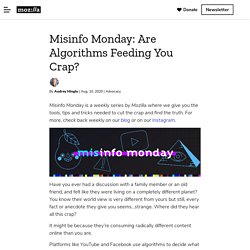
You know their world view is very different from yours but still, every fact or anecdote they give you seems...strange. Where did they hear all this crap? It might be because they’re consuming radically different content online than you are. Platforms like YouTube and Facebook use algorithms to decide what kind of videos and stories you’re most likely to enjoy based on past content you’ve watched or engaged with.
*Retraction Watch - Tracking retractions as a window into the scientific process (Scan a few recent posts)
*danah boyd: What Hath We Wrought? @ SXSW EDU 2018. *Affelt: Fake News The Library Imperative. PIL: information literacy in the age of algorithms: Student experiences with news and information, and the need for change. Big Tech’s Pandemic Power Grab - The Atlantic In the years before the virus, critics began to prophesy that a handful of tech companies would soon grow more powerful than the government.
Their scale and influence, and their ability to manipulate public opinion and shape markets, would permit them to reign unimpeded. That warning, however dark, didn’t quite capture the emerging strategy of these firms—a strategy that was in fact taking shape before the pandemic began—or the graver threat they pose.
Algorithmic Bias Explained. A Few Responses to Criticism of My SXSW-Edu Keynote on Media Literacy. Last week, I had the honor of keynoting SXSW-Edu. I was asked to be provocative and stir debate. You can read a crib of my talk here or watch the video. In my talk, I asked the audience and educators more broadly to challenge their assumptions about media literacy. Over the last week, I’ve been wading through the various public and private responses that I’ve received before crafting a broader response.
Misinfo Nation - Internet Citizen. In today’s media climate, it’s becoming harder and harder to tell what’s real and what isn’t. We’re bombarded daily with information — and misinformation — that’s trying to change the way we think about our government, our leaders, and even each other.
Misinfo Nation, an Original Short Film from Mozilla We invite you to watch Mozilla’s original documentary short film, Misinfo Nation: Misinformation, Democracy, and the Internet.
How Your Brain Tricks You Into Believing Fake News. What a Media Literacy Educator Hears When danah boyd Talks About Media Literacy. Ads on notice. Inside Facebook, Twitter and Google's AI battle over your social lives. When you sign up for Facebook on your phone, the app isn't just giving you the latest updates and photos from your friends and family.
In the background, it's utilizing the phone's gyroscope to detect subtle movements that come from breathing. It's measuring how quickly you tap on the screen, and even looking at what angle the phone is being held. Sound creepy?
*Stanford SHEG Report Executive Summary 11.21.16. How Can School Librarians Teach Media Literacy in Today's Highly Charged Media Landscape?
National Association for Media Literacy Education. Calling Bullshit 1.1: Introduction to Bullshit. UW iSchool: Calling Bullshit 9.2: Fake News Definitions and Examples. Real Solutions to Fake News: How Libraries Help. Why we need a new approach to teaching digital literacy - kappanonline.org. To assess the credibility of the information they find online, students shouldn’t start with a close reading of the given website.
Facebook, Google and others join The Trust Project, an effort to increase transparency around online news. *Inquiry Evaluation (Debbie Abilock) Knowledge Quest (Skim)
Fake News Timeline (Common Sense Education)
The librarian will see you now - Libraries Taskforce. [Editor’s note: Guest post written by Dr Caroline De Brún, Knowledge and Evidence Specialist, Public Health England]
The Information Literacy User’s Guide: An Open, Online Textbook. Introduction In 2010, a textbook being used in fourth grade classrooms in Virginia became big news for all the wrong reasons.
Finding Reliable Information Online Chapter 3 (Stebbins)
Misinformation Overload – John Hubbard. As Google Fights Fake News, Voices on the Margins Raise Alarm - The New York Times. SAN FRANCISCO — When David North, the editorial chairman of the World Socialist Web Site, noticed a drop in the site’s traffic in April, he initially chalked it up to news fatigue over President Trump or a shift in political consciousness.
School Librarians Are Teaching Digital Citizenship. April Wathen photo: Jill Springer April Wathen, Kathy Lester, and Steven Yates. As technology and social media play an increasingly big role in the classroom, educators are faced with challenges of teaching students how to use technologies in appropriate ways, and how to be safe and responsible online—the basic tenets of what is known as digital citizenship, a close relative of digital literacy. Fortunately, classroom teachers often have an expert ally to assist them in getting the job done: their school librarian or media specialist.
LOEX 2017: Teaching Popular Source Evaluation in an Era of Fake News, Post-Truth, and Confirmation Bias. Facebook, Google Spread Misinformation About Las Vegas Shooting. What Went Wrong? : All Tech Considered. UW professor: The information war is real, and we’re losing it. 104: Lane Wilkinson – Circulating Ideas.
Fighting Fake News: Can Technology Stem the Tide?
108: Jeremy Shermak – Circulating Ideas. The Word - Truthiness - The Colbert Report. 113: William Badke – Circulating Ideas. PolitiFact's guide to fake news websites and what they peddle. News Literacy.










